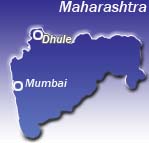DHL partners UNICEF to empower communities to improve child survival in Maharashtra
 New Delhi, Nov. 18 : DHL, the world’s leading express and logistics company, today announced its partnership with UNICEF and the Government of India in support of efforts to reduce malnutrition and infant mortality in the Nandurbar District of Maharashtra, India.
New Delhi, Nov. 18 : DHL, the world’s leading express and logistics company, today announced its partnership with UNICEF and the Government of India in support of efforts to reduce malnutrition and infant mortality in the Nandurbar District of Maharashtra, India.
DHL’s grant will fund a three-year UNICEF project to empower communities to improve child survival rates in 1,000 villages in Maharashtra.
Working together with the Government of India, the Government of Maharashtra, NGOs and other partners, UNICEF will use the US 650,000 dollars DHL grant to strengthen health infrastructure. This will include educating villagers on the prevention and treatment of common communicable diseases, providing immunizations and micronutrients to infants and young children.
The grant from DHL will be used jointly with communities and government functionaries to develop and implement village health and nutrition plans, setting up village information posts, training workers, mid-wives and setting up computer equipment for staff training and support.
The program is an extension of DHL’s global partnership with UNICEF. Globally, DHL’s parent company Deutsche Post World Net (DPWN) supports UNICEF projects in three regions around the world to reduce child mortality. The target for 2009 is to raise sufficient funds to vaccinate 50,000 children against the six major preventable child killer diseases. In India, funding by DHL will help accelerate UNICEF’s work with the Government to achieve the Millennium Development Goals to reduce the district’s under five mortality rate to 41 per 1000 live births by 2015.
In addition to the grant, DHL will also develop an employee volunteer program to enable staff from across the region to contribute their time to support UNICEF’s program in the Nandurbar District. Working alongside UNICEF, a number of volunteer programs are being planned to improve physical infrastructures and build capacity of local groups to improve quality of life among villagers in the region.
“The partnership with DHL is a good example of the private sector taking the initiative to champion developmental concerns in rural India complementing the Government’s commitment to ‘inclusive growth’,” said Vijay Satbir Singh, Secretary of Women and Child Development in Maharashtra, at the partnership ceremony launch. “Working closely with Panchyat Raj Institutions, NGOs and government functionaries for planning, implementation and monitoring, we look forward to a successful program that will put in place long-term improvements.”
“Our global partnership with UNICEF aims to reduce child mortality by using the potential of our 500,000 employees worldwide and the provision of our logistical core competencies in developing countries,” said Amadou Diallo, CEO, South Asia Pacific, DHL Global Forwarding. “This Asia partnership reinforces our commitment to support UNICEF’s efforts by facilitating access to health services.”
UNICEF, in conjunction with the Government of India, will develop community-led, cost- effective village action plans to improve health conditions and promote child survival. According to the Population Foundation of India (2008), the infant mortality rates in Nandurbar District, Maharashtra was at a high of 68/1,000 live births in 2001. Maternal mortality is estimated to be above 300 per 100,000 live births. UNICEF aims to reduce malnutrition among children below three years of age from 58 percent to 30 percent. Similarly, the project aims at reducing infant mortality to 30 per 1000 live births, while reducing maternal mortality by 30 percent.
At the request of the Chief Minister of the State in 2003, UNICEF and the District administration began their work in the Nandurbar District. UNICEF has initiated community planning sessions around children’s issues in each of the 1,000 villages and 1,437 hamlets of the District. About 4,000 youth volunteers have been trained on maximizing community participation in this program.
“Community involvement is the key to sustainable development. If we are serious about improving child survival and reducing maternal mortality, we must give youth and their families the tools that will enable them to survive and lead healthy lives,” said Karin Hulshof, UNICEF Representative in India. “This grant from DHL will allow UNICEF and its partners to address the most pressing needs of children in this district.” (ANI)